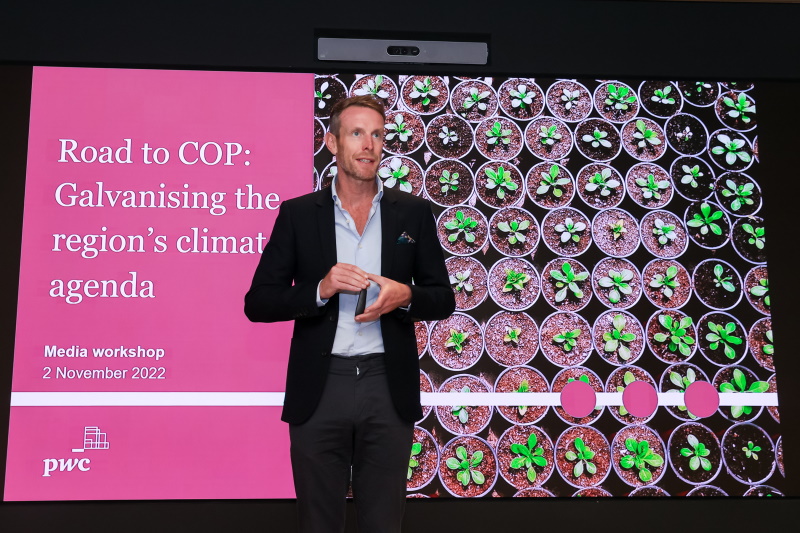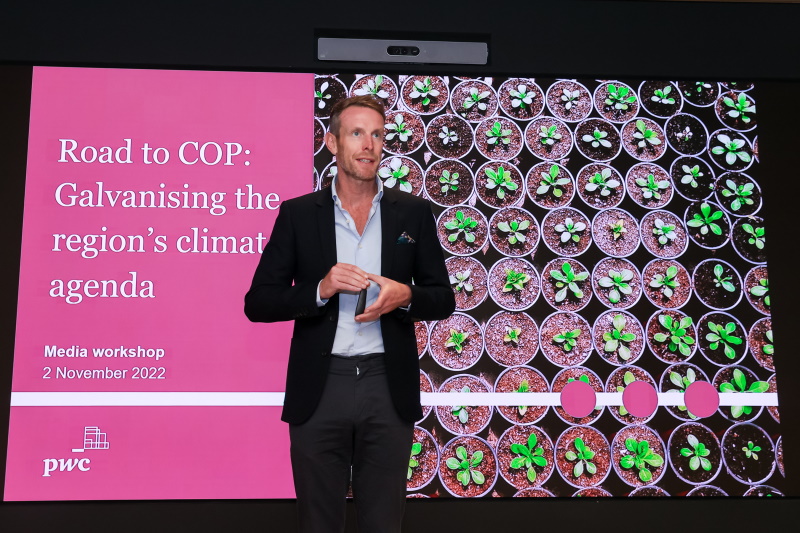
Road to COP27: Middle East to play a crucial role in advancing global climate change agenda, PwC workshop
In the Middle East climate change and energy transition imperatives are helping to accelerate the massive and fast transformation of the region. Governments must balance the potentially profound impacts of climate change on the region with the strategic role the region will play in energy transition, pioneering hydrogen and circular economies and developing sustainable destinations.
According to PwC’s latest Middle East Economy Watch, the continued strong oil revenue across the GCC helps to maintain fiscal surplus, in turn enabling higher levels of spending which can be reinvested in renewables to help fund the energy transition, reducing the domestic consumption of hydrocarbons. Public and private sector collaboration in the GCC and MENA will be essential to make this work according to a recent workshop titled “Road to COP: Galvanising the region’s climate agenda” hosted by PwC in Dubai for regional media today.

Ahead of the much-anticipated COP27 to be held in Sharm-El-Sheikh, experts from PwC’s Climate Action Taskforce discussed how the Middle East is at the heart of ambitious decarbonisation agendas, its growing commitments to climate change, and how COP27 and COP28 will provide an ideal platform for countries and companies in the region to reaffirm their commitment, accelerate their action towards sustainable energy, and develop a common vision for moving forward on the climate agenda.
The workshop provided insights on climate change challenges, economic opportunities, and competitive advantages from stepping up the climate agenda, and further outlined region-specific policy options, investments and new frontiers in technology to address these pressing challenges for both the public and private sector.
With only 1%[1] of the earth’s total renewable water sources, the Middle East is the most water-stressed region in the world, with nine out of the world’s 10 most water-poor countries based here. This places water scarcity as a key priority and concern that has strong implications for food security and the sustainability of livelihoods. Given current water consumption patterns, reduced rainfall and desertification only compounding these challenges for the region, Middle Eastern governments, businesses and communities have important stakes in the outcomes of COP27 in Egypt and COP28 to be hosted by the UAE in November 2023.
Furthermore, the GCC countries specifically have a responsibility towards transitioning to low-emissions economies, with five of the six GCC members ranking in the top 10 for per-capita GHG emissions - producing about four times the world average per person. Sustainable consumption is also a pressing concern with Qatar and UAE among the five countries with the earliest ‘overshoot days’ i.e countries that are using up natural resources much faster than recommended.
Experts including Stephen Anderson, PwC Middle East’s Strategy & Markets Leader, Dr Yahya Anouti, PwC Middle East’s ESG Leader, Dina Storey | ESG Partner & ESG Impact Centre Lead and Gavin Aspen, PwC's Academy Leader offered insights on the current state of climate change actions in the region, and delved into the opportunities and creative solutions for businesses and governments to tap into and advance their climate agenda, and most importantly discussed the pressing funding gaps and risks that need be assessed by the public and private sector.
Dr Yahya Anouti, PwC Middle East ESG Leader, commented: “It is time to switch our collective pledges into collective actions, and the Middle East can play a crucial role in advancing the global climate change agenda over the next decade. The region is well positioned to drive the transition to a low-emissions economy by leading the world in the shift to renewable energy sources, as it is blessed with an abundance of natural resources such as year-round sunshine, and large quantities of cheap marginal land that result in solar power costs being among the lowest in the world. Countries in the region are consequently investing significantly towards green hydrogen, ramping up green finance and developing critical capabilities around innovative climate technologies that can sustainably fuel the region’s decarbonised future and clean energy ambitions.”
Stephen Anderson, PwC Middle East Strategy & Markets Leader, commented: “At PwC, we work with our clients to help them prepare for a decarbonised and more sustainability-focused future. I’m looking forward to attending COP27 next week and we are proud to help the Middle East play a leading role in shaping the global agenda. Business leaders are increasing their focus on all aspects of ESG to both meet the needs of their stakeholders and the planet, and to seize the opportunities, and, while this is a step in the right direction, we believe that now is the time for ever greater action.”
To address the climate challenge, a radical transformation is needed in every sector of the global economy and across all parts of the world. Businesses and economies must evolve quickly to address the significant challenges facing our society and planet. PwC is making a worldwide science-based commitment to achieve net zero greenhouse gas (GHG) emissions by 2030, which includes supporting its stakeholders to lower the emissions as well as reducing those from the PwC network’s operations and suppliers. As members of #RE100, a global energy initiative made up of the world’s most influential businesses committed to 100% renewable electricity, PwC’s UAE, Jordan, & Egypt offices are also now completely powered by renewable electricity.
With its new robust global strategy, The New Equation in place, PwC is committed to transforming its business model to decarbonise its value chain, increasing transparency, and supporting the development of strong ESG reporting frameworks and standards.


























